As 2018 grinds to a halt, it’s time to take a step back and look the year that was. In accordance with tradition, I’ll take a deep dive into the books I’ve read (as well as the movies I’ve watched and beers I’ve drank, though those will have to wait). I keep track of my reading at Goodreads (we should be friends there), and they have a bunch of fancy statistical visualization tools that give a nice overview of my reading habits over time, especially now that I’ve been doing so for 9 years. This year, they’ve even introduced a couple new graphs, which will be fun. Starting off simple though, with the total number of “books” read:
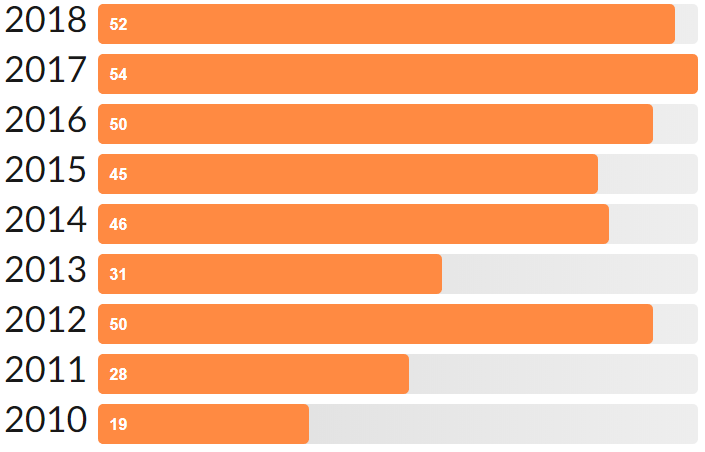
I read 52 books in 2018, which is just two shy of the record I set last year (and still the second best year in recorded history (i.e. the last 9 years)). It’s worth noting that a fair amount of these titles are actually short fiction, but we’ll get more into that later. Full list of titles here. Also of note, a significant amount of these were audiobooks, which sometimes feels like cheating. These disclaimers also applied to last year’s record-setting run, so I feel like I did alright, especially considering the next way to slice reading, where I did set a new record – total number of pages read:
It’s important to note the inherent variability of page numbers, but I managed to exceed the previous record by almost a thousand pages, which ain’t too shabby (last year’s record setting total was only about 100 pages more than the previous record). Some additional info:
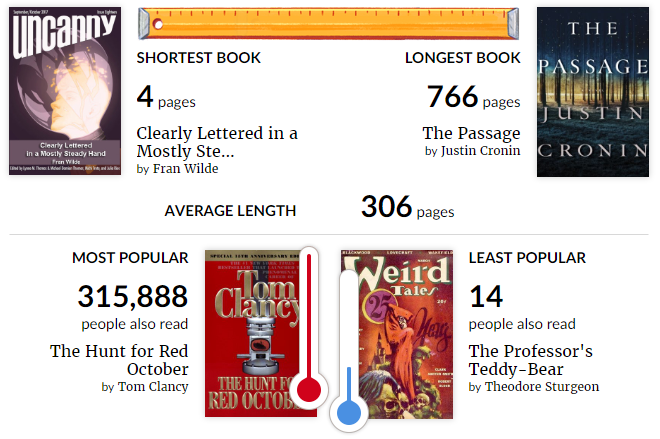
While I did read short fiction this year, which does indeed help to inflate “book” totals, the average book length this year was 306 pages – a huge improvement over last year’s 279 pages. This means that I read lots of longer books (i.e. 500+ page books) to make up for the handful of short stories (and to a lesser extent, the 150 page novellas). The record for average book length was set in 2013, a year in which I specifically and intentionally set out to read massive doorstops (and even then, the average was 356 pages). The longest book I read all year was Justin Cronin’s The Passage at a respectable 766 pages (though a far cry from my record, which is somewhere in the 1000+ page range).
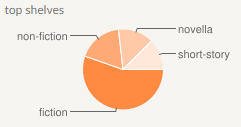
The pie chart breaks things down a bit further, though it’s a weird graph due to the dumb way I categorize stuff on Goodreads (i.e. fiction, short story, and novella contain lots of overlap, non-fiction has no overlap). Still, roughly on par with previous years in terms of short fiction, with a mild increase in both novellas and non-fiction.
In terms of publication dates, I curse myself every year for having read Alice in Wonderland and The Picture of Dorian Gray in 2010, thus stretching out the vertical axis of this graph. I’ve done a decent enough job spreading out my reading, though there’s still a big recency bias here, probably owing to my participation in the Hugo Awards as well as generally keeping up with favorite authors. These things happen, but as it turns out, January is Vintage SF Month, so I will most certainly hit some older stuff that month (as well as the rest of the year).
Ohhh, new graph! This one is for books over time (with a monthly period), which sounds great, but ends up producing weird spikes when I finish books at the beginning of a given month or when I read through, for example, the short story category of the Hugos. Still, it’s neat, and I always grumble about wanting more visualizations, so this is welcome.
As is this one, which is page numbers over time. Alas, it falls prey to the same issue as the books over time graph, and indeed, books that I slowly read over several months get all their pages attributed to the month in which I complete something, which creates some of these spikes. I think there are ways to log progress throughout reading, but that might be too much manual effort for even me (though it would be interesting).
Some more assorted observations on the year’s reading:
- Only 10 non-fiction books in 2018, which is actually an improvement over 2017 (when I had just 7), but still something I should probably try to improve in 2019.
- Only 15 books were written by women, which is a step down from last year when the proportion was roughly 50%. Then again, none of this happened by design and just came in the natural course of reading, so go figure.
- The oldest book I read all year was Isaac Asimov’s robot story Runaround (for the 1942 Retro Hugos, which I didn’t vote in because I didn’t end up reading all the stories). Since that was a short story, the oldest actual “book” was Leigh Brackett’s The Big Jump, written in 1955.
- A brief scan of the list sees that somewhere around 30 were Science Fiction, which is about in line with previous years (but more than last year, which was a divergent year for some reason).
And that about covers it. Stay tuned for a overall movie recap, followed by the traditional onslaught of the Kaedrin Movie Awards. Sprinkled in there will be some reviews for Vintage SF Month, because I’m looking forward to that…
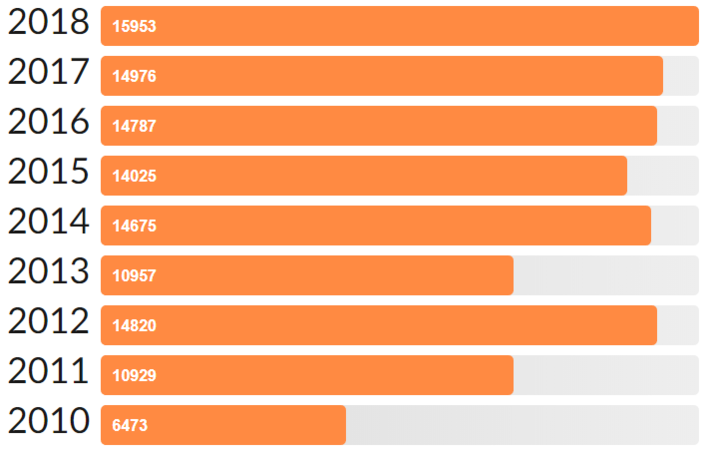
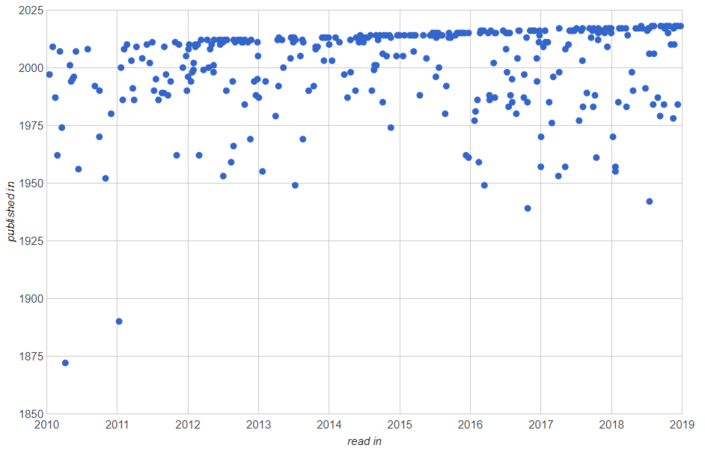
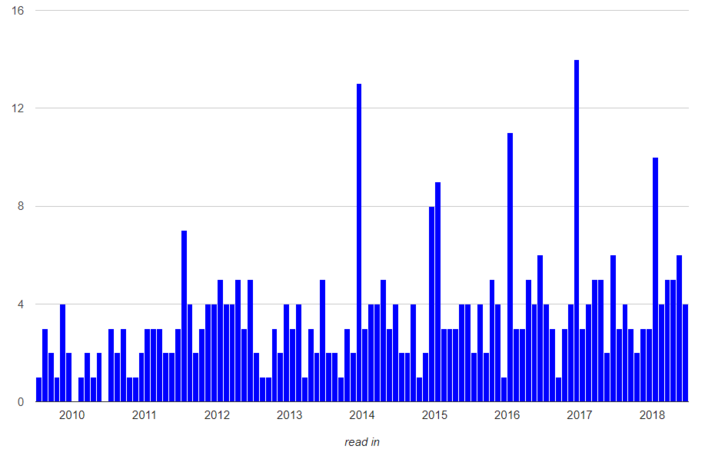
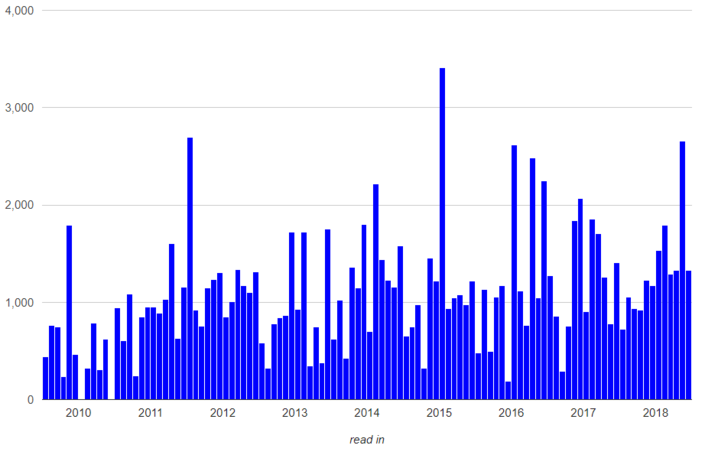
I enjoy good reads, not least because the social media aspects are minimal. I enjoy the yearly reading challenge – upped my goal to 60 this year.
While I’m ok with audiobooks towards the goal, I felt somewhat conflicted about using podcast episodes. All Dan Carlin, and while his longer series are unquestionably audiobook in length and format, stand-alones are not as much. I think I’ll avoid those this year.
Haven’t played with the data. This was my first year, so no good year to year data anyway. And I don’t really do data analysis for fun anymore, I get enough of that at work.
I got up to 54 last year, but I really do feel like reading short fiction is a bit of a cheat. Doesn’t stop me though! Audio books are really a savior, but I do feel like I need to do a better job carving out time to actually sit down and read. I used to be better at that. I’ve never considered podcast episodes, though I suppose some of them would count (My assumption is that if it’s listed on goodreads, it’s fair game, but yeah, I’d be a little conflicted there too, I guess.)
I’m a sucker for data (as the past couple weeks’ posts show) and am always annoyed that there aren’t more measurements available. I’m especially annoyed by Amazon’s Kindle, which should have a treasure trove of information about reading habits that would probably be eye opening, but which is all locked up somewhere on an Amazon server. What’s more, I’m positive that they use the aggregated data to do stuff (such as calculating average reading times, which are almost always lower than my reading speed, I guess), so it’s like they’re rubbing it in. Not that I’m really doing a ton of actual “analysis”, but still…
Some podcast episodes are straight up audiobooks. Hardcore History, especially the longer series are many hours long in great depth. And even the recent standalone episodes clock in over 4 hours, I have no qualms about counting those. but some of the older ones, “blitz,” and “Addendum” ones are only 1 – 1.5 hours, feels like a bit of a cheat. As you note, they are listed on goodreads, so…
It irritates me to no end that any time I put the Kindle down, it assumes I’m still reading and uses that time to calculate my average reading times. I find that stat as reported to be so wrong as to be useless.
I hear you, though, it’s so much harder to carve out actual time to sit and read. 1 hour each way commute and recorded media sure helped last year – wonder what % of my actual reading last year was recorded media (or hotel room boredom kindle reading)?